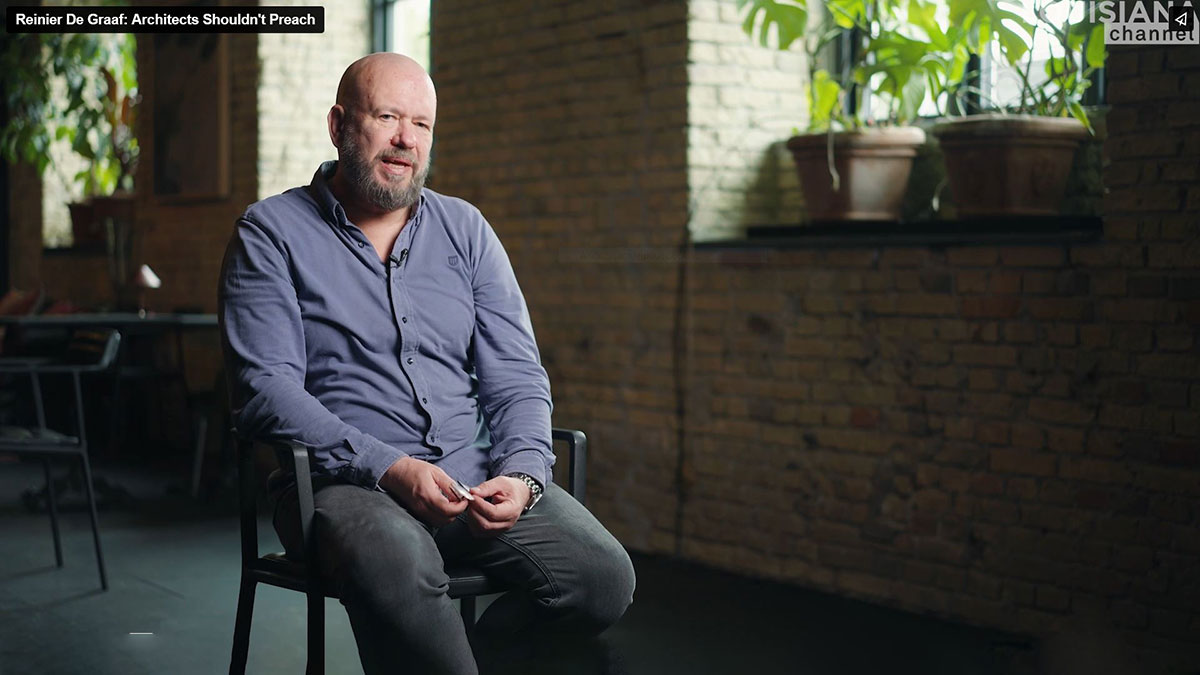VIDEO: Reinier De Graaf-Architects Shouldn’t Preach
 “I had a perverse fascination for the urban. And it persists until today.” Meet one of the most prolific and outspoken architects of our time, Reinier De Graaf, who for more than 25 years has been a leading figure at the Office for Metropolitan Architecture (OMA). “My interest in architecture is very broad. From the small scale to the large scale to scales so large that you can wonder whether you are still dealing with architecture. Over the years, I have become less interested in architecture in terms of doing buildings and more interested in architecture in a metaphorical scale where it also has an interface with political choices.”
“I had a perverse fascination for the urban. And it persists until today.” Meet one of the most prolific and outspoken architects of our time, Reinier De Graaf, who for more than 25 years has been a leading figure at the Office for Metropolitan Architecture (OMA). “My interest in architecture is very broad. From the small scale to the large scale to scales so large that you can wonder whether you are still dealing with architecture. Over the years, I have become less interested in architecture in terms of doing buildings and more interested in architecture in a metaphorical scale where it also has an interface with political choices.”
“Architecture reflects life and all the demands and expectations placed upon it. But I think architecture is also a terrific lens towards the complexity of life. As an architect, you are incredibly dependent on the forces that shape architecture. You can’t engage with reality the way an artist would engage with reality. Or an opinionmaker would engage with reality. You have to get to the bottom of things and then somehow, in the inextricable cocktail that is life, make something that works.”
“Bernard Rudofsky wrote this beautiful book “Architecture Without Architects”. I think we are increasingly seeing a world of architects without architecture. Who are instead storytellers, opinionmakers, visionaries, educators – anything but the architect who engages with the mainstream, that is, to create a better built environment. So, we have preachers instead of practitioners.”
“It’s a problem of architecture, but also a problem of the Western world, which is increasingly wrapped up in an urge to apologize. And, of course, it has things to apologize for. But if it, in the process, completely forgets what it also has achieved, then a lot of the good things will be forgotten and passed away like the child in the bathwater. There has to be a more healthy balance than at present. We shouldn’t constantly measure the past with the moral standards of today.”
Reinier de Graaf (b. 1964 in Schiedam) is a Dutch architect, urbanist and writer. He is a partner at the Office for Metropolitan Architecture (OMA) in Rotterdam and is responsible for building and master planning the firm’s projects in Europe, Russia, and the Middle East. His built projects include – besides many others – Norra Tornen in Stockholm, which won the International Highrise Award in 2020. De Graaf has also worked extensively in Moscow, overseeing OMA’s proposal to design the masterplan for the Skolkovo Centre for Innovation, the ‘Russian Silicon Valley’, and leading a consortium which proposed a development concept for the Moscow Agglomeration, an urban plan for Greater Moscow. In 2002, he co-founded AMO, OMA’s think tank. AMO’s clients include Prada, Universal Studios, Condé Nast, Schiphol Airport, Harvard University and the European Union, for which it conceived a new graphic identity in 2004, including a proposal for a new European flag. De Graaf has overseen AMO’s increasing involvement in sustainability and energy planning, including Zeekracht: A Strategy for Masterplanning the North Sea; the publication of Roadmap 2050: A Practical Guide to a Prosperous, Low-Carbon Europe with the European Climate Foundation in 2010; and The Energy Report, a global plan for 100 percent renewable energy by 2050, with the WWF.
Reinier is the author of “Four Walls and a Roof: The Complex Nature of a Simple Profession,” the novel “The Masterplan”, and the recently published “architect, verb – The New Language of Building”. He has curated the exhibitions “The Image of Europe”, an exhibition illustrating the history of the European Union; “On Hold” at the British School in Rome (2011); and “Public Works: Architecture by Civil Servants” (Venice Biennale, 2012; Berlin, 2013).
Reinier De Graaf was interviewed by Marc-Christoph Wagner in July 2023. The conversation took place in connection with the World Congress of Architects, UIA 2023, in Copenhagen, Denmark. Camera: David Schweiger, Edited by: Jarl Therkelsen Kaldan, Produced by: Marc-Christoph Wagner, © Louisiana Channel, Louisiana Museum of Modern Art, 2023.
Louisiana Channel is supported by Den A.P. Møllerske Støttefond, Ny Carlsbergfondet and C.L. Davids Fond og Samling. This film is supported by Dreyersfond and Fritz Hansen
